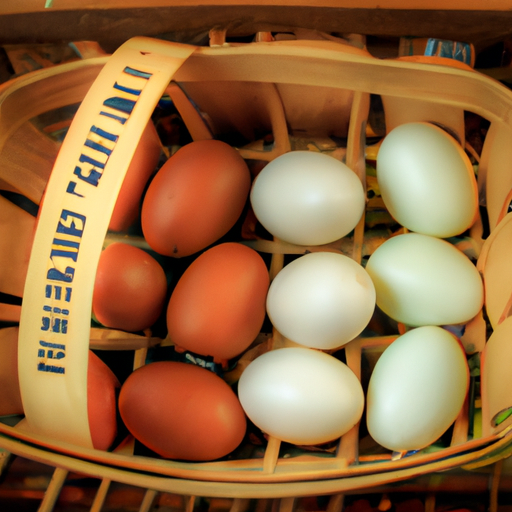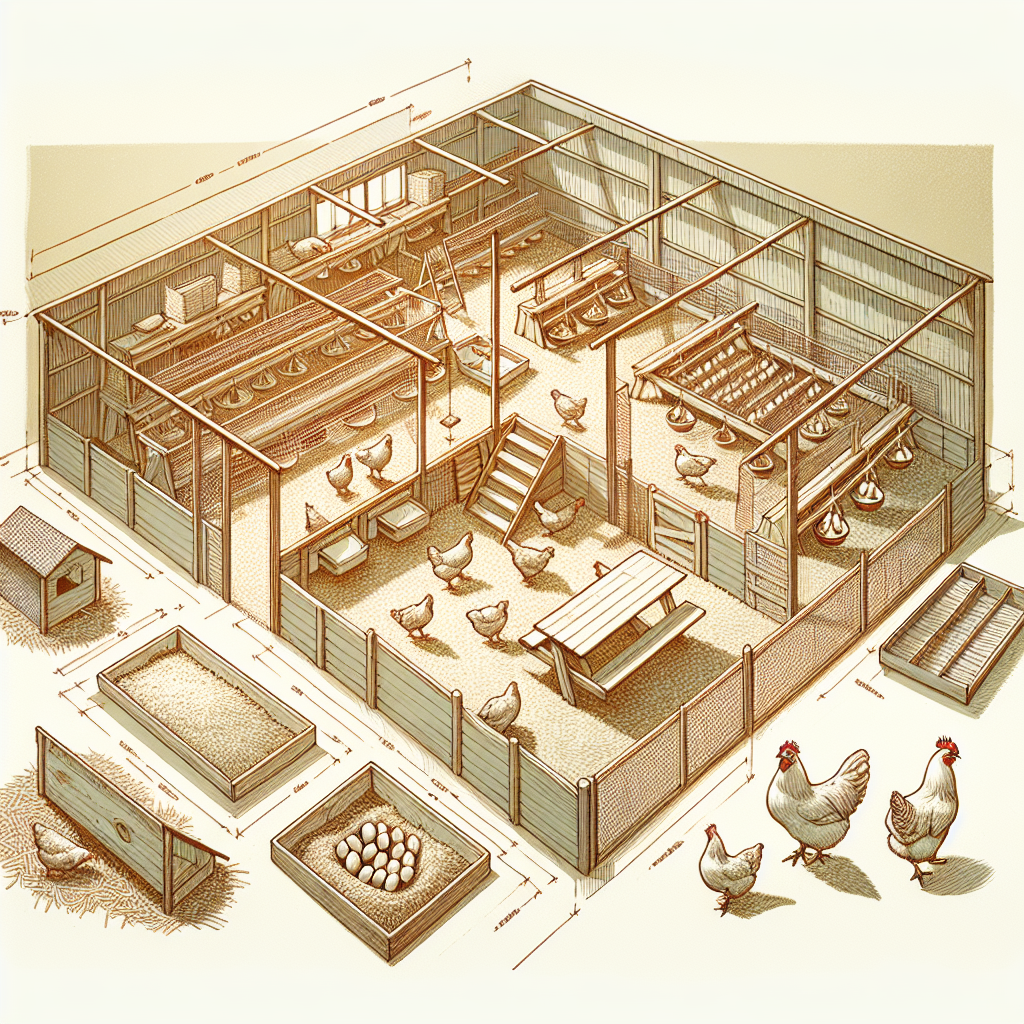If you’re a proud chicken owner and have been wondering how to increase the egg production of your hens without resorting to artificial methods, you’ll be delighted to discover a range of natural strategies. From providing a balanced diet and ensuring ample access to fresh water to creating a comfortable and stress-free environment, there are several simple yet effective ways to encourage your hens to lay more eggs. In this article, we will explore these techniques so you can give your feathered friends the loving care they deserve while enjoying a bountiful supply of farm-fresh eggs.
Proper Nutrition
Balanced Diet
A balanced diet is crucial for ensuring optimal health and productivity in hens. It should include a combination of grains, fruits, vegetables, and protein sources. Offering a variety of food options will not only provide essential nutrients but also prevent boredom. Make sure to provide a commercial feed specifically formulated for laying hens, as it contains all the necessary vitamins and minerals required for egg production.
Calcium Supplementation
Calcium plays a vital role in the formation of eggshells, so it is essential to ensure that your hens are getting enough calcium in their diet. One way to provide this is by offering oyster shells or crushed eggshells as a supplement. These calcium-rich sources will help strengthen the shells and prevent any issues or deficiencies.
Omega-3 Fatty Acids
Including omega-3 fatty acids in your hens’ diet can have numerous benefits for both their health and egg production. You can achieve this by incorporating flaxseed or chia seeds into their feed or by providing them with fresh greens such as spinach or kale. Omega-3 fatty acids have been linked to increased fertility and improved egg quality.
Protein-Rich Diet
Protein is an essential nutrient for hens, especially during the egg-laying period. It is responsible for the development of high-quality eggs and the overall health of the birds. Ensure that your hens are receiving adequate amounts of protein by including sources such as soybean meal, fish meal, or mealworms in their diet. A protein-rich diet will promote healthy egg production and support the overall well-being of your flock.
Stress Reduction
Provide Adequate Space
One of the primary factors contributing to stress in hens is overcrowding. To ensure their well-being and encourage optimal egg production, it is crucial to provide them with adequate space. Each hen should have at least 4 square feet of living space in the coop and sufficient space to roam in the outdoor area. Sufficient space allows hens to engage in natural behaviors, reducing stress levels.
Reduce Noise Levels
Excessive noise can be extremely stressful for hens and negatively impact their egg production. Try to minimize loud noises in the coop, such as constant machinery noises or loud music. Additionally, it is advisable to locate the coop away from sources of loud noises, such as busy roadways or construction sites. A calm and quiet environment will promote a more relaxed and productive flock.
Minimize Disturbances
Hens are sensitive creatures, and disruptions to their routine can cause stress. Minimize disturbances in their environment by avoiding sudden changes or frequent handling. While it is important to interact with your flock, try to establish a consistent routine to avoid unnecessary stress. A calm and predictable environment will contribute to improved egg production and the overall well-being of your hens.
Lighting
Maintain Optimal Day Length
Light plays a crucial role in regulating hens’ reproductive cycles and, consequently, egg production. To maximize egg production, it is important to maintain an optimal day length. During the egg-laying season, ensure that hens receive at least 14-16 hours of light per day. Providing a consistent source of natural or artificial light will help maintain the desired day length and stimulate continuous egg production.
Use Artificial Lighting
In situations where natural lighting is insufficient or inconsistent, artificial lighting can be a valuable tool for maintaining optimal day length. Install light fixtures such as LED lights in the coop and set them on timers to provide the necessary hours of light each day. Be careful not to use excessively bright lights, as it may disrupt sleep patterns and cause stress to the hens. Artificial lighting is a helpful supplement to ensure consistent egg production year-round.
Hydration
Ensure Fresh Water Availability
Proper hydration is essential for the overall health and productivity of your hens. Make sure to provide fresh and clean water at all times. Check the water sources daily, clean them regularly, and ensure they are easily accessible to all hens. Dehydration can lead to a decrease in egg production, so maintaining proper hydration is crucial for a thriving flock.
Use Electrolyte Supplements in Hot Weather
During hot weather, hens can be prone to dehydration. Electrolyte supplements added to their water can help replenish lost minerals and maintain hydration levels. These supplements contain essential electrolytes such as sodium, potassium, and chloride, which are vital for the hens’ overall health and egg production. Utilizing electrolyte supplements during times of heat stress will ensure your hens stay hydrated and productive.
Health Maintenance
Regular Vaccinations
Vaccinations are a crucial aspect of maintaining a healthy flock and preventing diseases that can affect egg production. Consult with a veterinarian to determine which vaccinations are necessary for your specific region and flock. Follow the recommended vaccination schedule to protect your hens from common diseases such as Newcastle disease and Avian influenza. Regular vaccinations will help ensure your flock is healthy and productive.
Parasite Control
Parasites such as mites and worms can significantly impact the health and egg production of your hens. Implement a regular parasite control program by administering deworming treatments and conducting regular coop cleanings. Additionally, ensure that your hens’ living area is thoroughly cleaned and regularly inspect them for any signs of parasites. By effectively managing parasites, you can help maintain a healthy flock and optimal egg production.
Environmental Enrichment
Provide Dust Baths
Dust bathing is a natural behavior for chickens and serves as a way for them to clean their feathers and keep parasites at bay. Provide a designated area in the coop or run where they can indulge in this behavior. Offer a mix of sand, dirt, and wood ash to create a dust bath that your hens will enjoy. By allowing your hens to engage in this natural behavior, you create a more enriched environment that promotes their overall well-being and contentment.
Integrate Perches and Nest Boxes
Offering perches and nest boxes allows hens to exhibit natural behaviors and provides them with a sense of security. Install perches at varying heights to accommodate different preferences and instincts. Nest boxes should be comfortable, private, and in a quiet area to encourage egg-laying. By providing perches and nest boxes, you create a stimulating environment that contributes to healthier and happier hens.
Breeding Strategies
Introduce High-Egg-Laying Breeds
Incorporating high-egg-laying breeds into your flock can positively impact overall egg production. Research and select breeds known for their high productivity, such as Leghorns or Rhode Island Reds. Introducing these breeds can improve the overall productivity of your flock and increase the number of eggs laid. It is important to carefully introduce new birds to the flock and monitor their integration for a smooth transition.
Consider Crossbreeding
Crossbreeding can be an effective strategy to enhance egg production in your flock. It involves mating hens of different breeds to take advantage of the desirable traits from each breed. Crossbreeding should be done carefully and planned with specific goals in mind, such as increased egg production or improved disease resistance. Seek advice from experts or experienced breeders before embarking on a crossbreeding program.
Reduce Molting Periods
Limit Stressful Situations
Stressful situations can trigger molting in hens, leading to a pause in egg production. To reduce the duration and intensity of molting periods, it is important to minimize stress in their environment. Avoid sudden changes, excessive handling, or exposure to extreme temperatures. A calm and consistent environment will help reduce stress levels and minimize the impact on egg production.
Optimize Nutrition during Molting
Proper nutrition is crucial during the molting period to support the hens’ overall health and ensure a smooth transition. Increase the protein content in their diet, since protein is necessary for feather regrowth. Supplement their feed with high-quality proteins such as soybean meal or fish meal to provide the necessary nutrients for molting. Optimizing their nutrition during molting will aid in quicker feather regrowth and a faster return to regular egg production.
Observe and Monitor
Monitor Egg Production
Regularly monitor the number and quality of eggs your hens are laying. Keep track of any fluctuations or changes in production and identify any potential issues early on. Monitoring allows you to make informed decisions regarding nutrition, health, and environmental practices. By observing the patterns in egg production, you can take necessary steps to maintain a consistent and productive flock.
Observe Behavioral Changes
Changes in behavior can be an indicator of underlying health issues or stress. Continuously observe your hens for any abnormal behaviors, such as reduced activity, decreased appetite, or changes in flock dynamics. This vigilant monitoring will help you catch any potential concerns early on and take appropriate measures to address them. By being attentive to behavioral changes, you can ensure the overall well-being and egg production of your flock.
Supplements and Herbs
Seaweed Supplements
Seaweed supplements can provide a natural boost to hens’ egg production. Seaweeds are rich in vitamins, minerals, and trace elements that promote overall health and enhance productivity. Introduce small amounts of seaweed supplements to the hens’ diet, gradually increasing the dosage. The natural properties of seaweeds have been known to improve egg quality, increase fertility, and boost immune function in chickens.
Diatomaceous Earth
Diatomaceous earth is a naturally occurring substance that can be used as a supplement for hens. It acts as a gentle abrasive, helping to control external parasites such as mites and lice. By dusting the Diatomaceous earth in the coop and on the hens’ feathers, you can effectively manage external parasites and support a healthy flock. Ensure that the Diatomaceous earth used is food-grade for the safety of your hens.
Nest Box Herbs
Certain herbs have properties that can benefit hens’ overall health and egg production. Incorporate herbs such as lavender, rosemary, or mint into the nest boxes to provide a natural calming effect. These herbs can also act as natural insect repellents, discouraging pests from invading the nesting area. The aromatic properties of these herbs create a more pleasant environment for your hens while promoting their well-being and laying habits.
By following these natural strategies to boost egg production, you can create an environment conducive to optimal health and productivity for your hens. Remember to always prioritize their nutrition, reduce stress levels, provide appropriate lighting and hydration, and observe and monitor their behaviors. With proper care and attention, you can ensure a consistent supply of high-quality eggs from your flock while maintaining their overall well-being.




